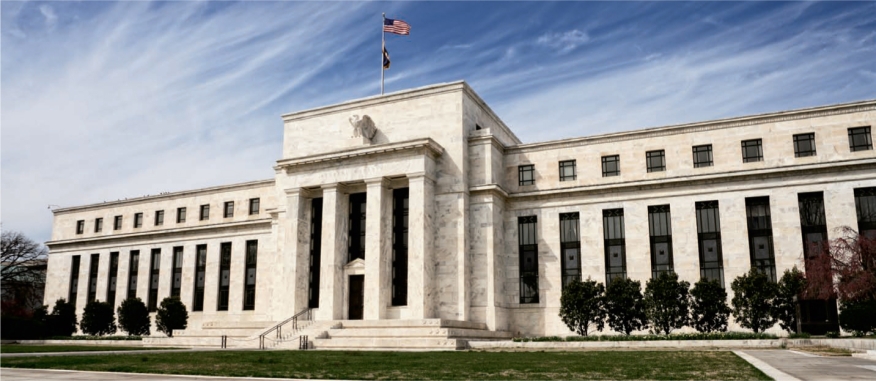
The Fed: Rate Hike Likely Coming in June

Federal Open Market Committee's December minutes reveal discussion of first hike in federal funds rate in 2Q of 2022, as well as of ending asset purchases by March.
- Officials discussed ending the Fed's purchases of Treasury securities and mortgage-backed securities (MBS) by March.
- Also discussed reducing its balance sheet and scheduling the first increase in the federal funds rate in June.
- Economist says tighter monetary policy in 2022 could result in moderation of housing prices.
Talk about a wakeup call.
The Federal Reserve on Wednesday released the minutes of its Federal Open Market Committee (FOMC) monthly meeting, held Dec. 14-15, and it packed a wallop: officials discussed not only ending the Fed's purchases of Treasury securities and mortgage-backed securities (MBS) by March, but also of reducing its balance sheet and scheduling the first increase in the federal funds rate much earlier than expected.
With The Fed discussing pumping the brakes on the economy, the markets immediately reacted: the S&P 500 fell 1.9%, the Down Jones industrials fell 1.1%, and the NASDAQ fell 3.3%, its largest one-day percentage drop since last February.
Meanwhile, yields on 10-year Treasurys spiked above 1.7%, highest since April 2021. The 10-year Treasury is considered a key barometer for mortgage rates. Freddie Mac reported this morning that the 30-year, fixed-rate mortgage rose to 3.22% this week, the highest level since May 2020 and more than half a percent higher than in January 2021.
According to the meeting minutes, it was "broadly projected that the committee would quicken the pace of reduction in the Federal Reserve's net purchases" of securities, which were intended to aid the economy during the COVID-19 pandemic, with the purchases now expected to end in March. The committee also discussed significantly advancing the projected timing of the first increase in the target range for the federal funds rate "from the first quarter of 2023 to June 2022."
In addition, nearly all on the committee "agreed that it would likely be appropriate to initiate balance sheet runoff at some point after the first increase in the target range for the federal funds rate." The Fed currently holds $8.3 trillion in Treasurys and MBS.
As CNBC noted, expectations are that the Fed will start raising its benchmark interest rate in March, meaning the balance sheet reduction could start before summer. The minutes also stated that once the process begins, “the appropriate pace of balance sheet runoff would likely be faster than it was during the previous normalization episode,” in October 2017.
Kathy Jones, chief fixed income strategist at Charles Schwab, told CNBC that the minutes showed that the committee members did "more than talk about this. Obviously, there was a fairly lengthy discussion. This was a pretty serious conversation."
“The fact that almost all participants agreed that it was appropriate to initiate the balance sheet runoff after the first increase in the target range for the fed funds rate implies that there’s not a big appetite for ‘let’s wait and see,” Jones told CNBC. “Last time, they waited two years. This time, it looks like they’re ready to go.”
CNBC noted that "during that 2017-19 reduction, the Fed allowed a capped level of proceeds from the bonds it holds roll off each month while reinvesting the rest. The central bank started by allowing $10 billion of Treasurys and MBS each quarter to roll off, increasing by that much each period until the caps reached $50 billion.
That program was intended to significantly reduce The Fed's balance sheet, but it was interrupted by a global economic downturn in 2019, then by the pandemic in 2020. In all, the reduction amounted to only about $600 billion, CNBC said.
In their discussion in December, FOMC members did note that the "current economic outlook was much stronger, with higher inflation and a tighter labor market than at the beginning of the previous normalization episode" in October 2017. They also noted that The Fed's balance sheet is "much larger ... than it was at the end of the third large-scale asset purchase program in late 2014.
Some FOMC members also observed that "the balance sheet could potentially shrink faster than last time if the committee followed its previous approach in phasing out the reinvestment of maturing Treasury securities and principal payments on agency MBS." Other committee members raised concerns about vulnerabilities in the Treasury market and how that could "affect the appropriate pace of balance sheet normalization."
FOMC members also "emphasized that the decision to initiate runoff would be data dependent."
Odeta Kushi, deputy chief economist at First American Financial Corp., said the prospect of a "tighter Fed" in 2022 will likely put upward pressure on mortgage rates.
“Low mortgage rates have been a key driver of higher house-buying power over the course of the pandemic, and thereby demand," Kushi said. "The Fed’s massive bond purchases have helped keep interest rates low, providing homeowners with significant refinancing opportunities and boosting house-buying power. Rising demand in a severely supply-constrained market has contributed to one of the hottest housing markets on record, with house price appreciation breaking records.”
She added that a modest increase in mortgage rates due to tighter monetary policy could result in some much-needed house price moderation.
"Consensus forecasts estimate that rates will reach 3.7% by the fourth quarter of 2022," she said. "While higher than pandemic-era lows, mortgage rates of 3.7% are still very low from a historical perspective. If double-digit annual house-price growth persists in combination with modest increases in mortgage rates (holding income constant), there will be a negative impact on affordability. This may prompt some buyers to pull back from the market and sellers to adjust their price expectations, which may result in a moderation in house prices.”




